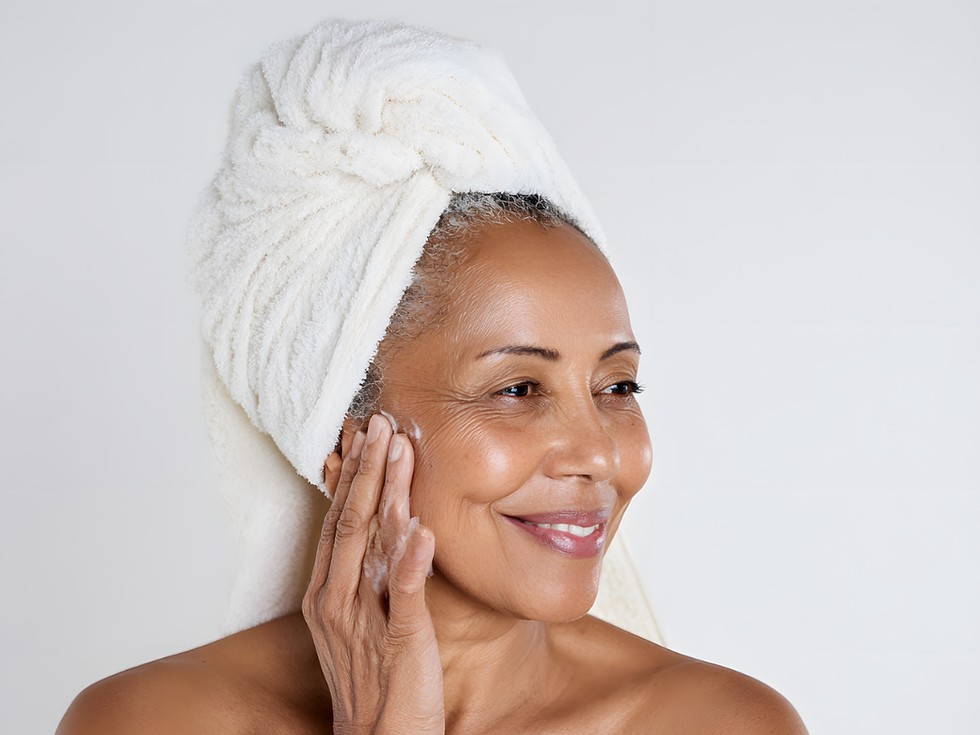Bakuchiol vs Retinol: Which Is Better for Sensitive Skin?
- May 7, 2025
- 4 min read
Updated: 2 days ago
You've heard retinol is the gold standard for smoothing fine lines and boosting cell turnover. But if you've got sensitive skin, you've probably also dealt with the aftermath—red patches, peeling, and that tight, angry feeling that makes you want to quit skincare altogether.
That's where bakuchiol comes in. It's marketed as the gentler cousin to retinol, promising similar benefits without the drama. So what's the actual difference between bakuchiol vs retinol, and which one should you trust with sensitive skin?
Here's what matters: bakuchiol delivers anti-aging results without triggering inflammation, while retinol works faster but often irritates reactive skin types. Both encourage collagen production and fade hyperpigmentation, but they get there through completely different pathways.

How Retinol Works (and Why It Irritates)
Retinol speeds up cell turnover by binding to specific receptors in your skin cells. This forces your skin to shed dead cells faster and produce fresh ones, which is why you see improvements in texture, dark spots, and fine lines within weeks.
The problem? That accelerated turnover disrupts your skin barrier temporarily. Your skin gets thinner and more vulnerable while it adjusts, which is why dermatologists tell you to start slow with retinol—it's not gentle by design.
If your skin already runs reactive, retinol can overwhelm it. You might handle the standard side effects (mild dryness, slight flaking), or you might end up with full-blown irritation that sets you back weeks. There's research from the American Academy of Dermatology showing retinol works exceptionally well for anti-aging, but they're also clear that sensitive skin types need careful management to avoid inflammation.
What Bakuchiol Does Differently
Bakuchiol is a plant-based compound extracted from the babchi plant. It doesn't function like retinol at all—it doesn't bind to retinoid receptors or force rapid cell turnover. Instead, it works by stimulating collagen and reducing oxidative stress without disrupting your barrier.
That means you skip the adjustment period. No peeling, no redness, no photosensitivity. You can use it morning and night without worrying about sun damage or layering conflicts with AHA or BHA exfoliants.
The trade-off is speed. Bakuchiol takes longer to show visible results—closer to 12 weeks instead of retinol's 4-6 weeks. But for sensitive skin, that slower pace might actually work better because you're building results without triggering inflammation.
Bakuchiol vs Retinol: Which Handles Sensitive Skin Better?
Bakuchiol wins here without question. It doesn't irritate melanin-rich skin, won't interfere with your barrier repair routine, and you can pair it with stronger actives like niacinamide without worrying about overloading your skin.
Retinol works if you can tolerate it, but that's a big if for sensitive types. Even the lowest concentrations (0.25% or 0.3%) can cause problems if your barrier is already compromised. And if you're dealing with conditions like rosacea or eczema, retinol might just make things worse instead of better.
Here's the thing people don't say enough: retinol isn't necessary for everyone. If your skin can't handle it without constant irritation, you're not missing out by choosing bakuchiol instead—you're just picking the ingredient that actually works for your skin type.

Can You Use Both Together?
Technically, yes. Some people alternate nights or use bakuchiol in the morning and retinol at night. But if you've got sensitive skin, this strategy usually backfires.
Layering both increases your risk of irritation without meaningfully boosting results. Bakuchiol won't make retinol gentler, and retinol won't make bakuchiol work faster. You're better off committing to one and giving it time to work rather than mixing them and confusing your skin.
If you're already using retinol successfully, there's no reason to add bakuchiol. And if retinol irritates you, switching fully to bakuchiol makes more sense than trying to force both into your routine.
What to Expect from Each Ingredient
With retinol, expect visible improvements in 4-8 weeks if your skin tolerates it. Fine lines soften, texture smooths out, and dark spots fade. You'll also deal with some level of dryness or flaking in the first few weeks, even with careful use.
Bakuchiol takes 8-12 weeks to show similar results. You'll see gradual improvement in skin firmness and tone without any of the adjustment symptoms. It won't give you the dramatic "skin cycling" transformation retinol can, but it also won't wreck your skin barrier in the process.
Both fade hyperpigmentation and boost collagen over time. The difference is how your skin feels while you're waiting for results—retinol makes you work for it, bakuchiol doesn't.
Which One Should You Choose?
If you've tried retinol before and it left your skin angry and peeling, switch to bakuchiol. If your skin is already dealing with irritation, compromised barrier function, or conditions like rosacea, bakuchiol is the safer bet.
Retinol still has its place for people with resilient skin who want faster results and don't mind the adjustment period. But for sensitive types, bakuchiol delivers what retinol promises without forcing you to power through weeks of discomfort.
You don't need to suffer through irritation to get anti-aging benefits. Pick the ingredient your skin can actually handle, then give it time to work.



